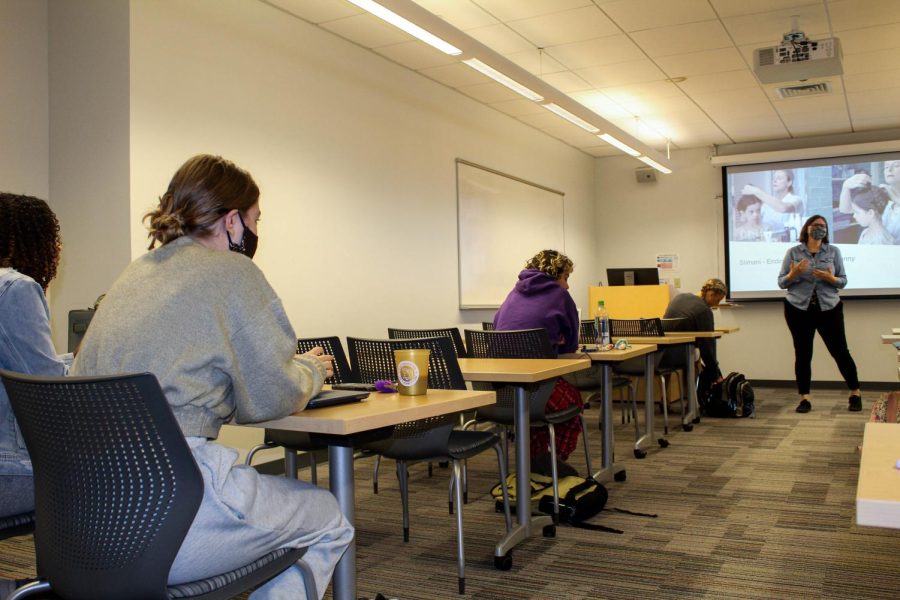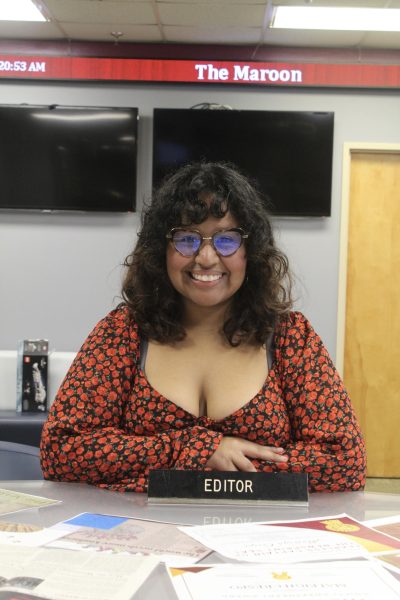Loyola adds new women writers courses
Professor Stacey Battis teaches Bad Moms: Literary Maternity on March 29, 2022. Classes on Jan 18, 2024 will be in-person after two days of online classes.
April 4, 2022
A new women’s writers course will be added to the Loyola core curriculum in the Fall 2022 semester as a course option for the writing about literature core requirement.
While this course isn’t the first to showcase the literary work of women, it’s an attempt to diversify Loyola’s curriculum, according to Maria Calzada, dean of the college of arts & sciences. Calzada said that it’s important that the university has a curriculum that reflects its student body, as 65% of the undergraduate body are women.
The course follows a unique format, different from other writing about literature classes, said Jason Ezell, associate dean of research, instruction, and assessment and chair of the standing committee on Loyola core. The new course will focus on studying literature by women while analyzing the texts through a lens of race, nationality, place, and belonging, Ezell said.
“It is imperative that we continue to diversify our curriculum to add to the educational experience of our students,” Calzada said.
Ezell said that the new format integrates modern examples of literature like articles and literary reviews written by women rather than traditional literary texts to help students analyze different forms of literature and reflect on issues of diversity, equity, inclusion, and social justice that may be closely intertwined with their everyday struggles.
As part of the writing about literature requirement, the class has been designed to develop students’ communication and critical thinking skills. It does so by developing the ways they interact with literary works outside the classroom.
“We recently assessed the writing about literature course and tightened its focus to emphasize thoughtful reading more than the volume of writing and to emphasize the many ways our society discusses literature, not just academic criticism,” Ezell said.
Patricia Boyett, co-chair of the women’s studies department and director of the women’s resource center said she found the course very exciting. She said that she would like to see the course proposed to the women’s studies department in the future, so it can become part of the women’s studies curriculum in accordance with Loyola’s English department.
“Diversity, equity, and inclusion in our curriculum is a really significant goal of a Jesuit university and a social justice mission,” Boyett said.
The writing about literature requirement offers a wide variety of courses with different areas of study from which students can choose, such as the “Women Warriors” course taught by Professor Elizabeth Watkins and “Bad Moms: Literary Maternity” taught by Stacey E. Battis.
Students are encouraged to participate in the standing committee on the Loyola core and university courses and curriculum committee meetings so they can help make changes to new and past accepted courses, Ezell said.
All courses are accepted as the committees see fit, but they do not compete against each other for a spot in the curriculum. If a course is of significant interest and of academic value to the students, it will be approved and added to the curriculum.
According to Ezell, professors can propose courses to their department at any time and if approved, the course will then be passed to the standing committee on the Loyola core for a vote and later to the university courses and curriculum committee who will hold a final vote. Once approved, the course will be implemented in Loyola’s course curriculum.









